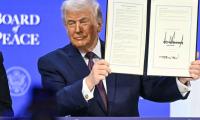Free market can lead to gross inequalities: economists
LAHORE: Almost all leading economists now agree that leaving everything to the free market does not work for the overall betterment of the economy, and left on its own, can lead to gross inequalities. “Consistently increasing inequalities would create unrest leading to political instability,” said economist Asif Ali Shahid. He
By Mansoor Ahmad
March 04, 2015
LAHORE: Almost all leading economists now agree that leaving everything to the free market does not work for the overall betterment of the economy, and left on its own, can lead to gross inequalities.
“Consistently increasing inequalities would create unrest leading to political instability,” said economist Asif Ali Shahid. He said recent happenings around the world have confirmed Adam Smith’s opinion that open market without proper regulation is barbarous. He said in the same way leaving everything to the state deprives the society of individual enterprises, creativity, and vibrant markets. Without the private sector, the thrust needed for growth cannot be sustained, he added.
Shahid said that by striking a right balance we could achieve the ideal goal of shared prosperity in every society. To achieve this aim, planners would have to pay special attention to the bottom 40 percent in each society. He said in poor countries top 10 percent have greater access to resources and wealth than the bottom 40 percent combined. “We will have to ensure that the bottom 40 percent enjoy basic amenities of life including access to education, health, and justice,” he said, adding that this can address the inequalities in poor societies.
He said development policies should aim to ensure that the poorest get adequate share in the pie as the economy grows.
He said economic development depends a lot on getting your fiscal policy right, monetary policy right, taxation right, but it is also rooted in human psychology, sociology, culture and norms. “We cannot ignore our norms and culture and now even the IMF and World Bank give weight to local norms in economic affairs.”
Social Worker Dr Kishwar Dhingra said that the first and the foremost priority of the planners should be to ensure food security. She said security should be both in quantity and quality. Pakistan today is in a position to guarantee everyone enough food.
The problem is not the availability of food, but how to get food to the people, and the current food system, dominated by exploitive middlemen, she added, has failed.
“Let us concede that inequality in Pakistan is determined at the time when a child is born. The child of a poor family faces deprivation and inequality from day one vis-à-vis the child born in a wealthy family,” she said.
Dr Kishwar expressed her view that policies should be formulated as per the available resources. Policies devised to reduce inequality in the United States may not work in Pakistan simply because of lack of resources. “We therefore should not study the policies of affluent country in reducing the impact of inequality in the early years of a child. We should in fact look at the success stories in emerging economies.”
She cited Bangladesh and Brazil as examples at the lower end of economic growth, where inequalities were appreciably reduced because of prudent government policies. She said conditional cash transfers have worked wonders to reduce poverty in many poor countries.
“We still continue with dole outs provided through Benazir Income Support Programme that has not raised the capabilities of the recipient to increase their earnings.”
Economist Faisal Qamar said political compulsions impeded the ability of many economies to grow sustainably. When means are meagre for development, prudence demands to use resources for projects that will yield benefits after 5-10 years; however, he said this will not suit the ruling political elite that have eyes on the next election to be held in three to four years.
He said there is no dearth of good economic planners in the country but the state certainly lacks the implementation capacity. Even the required skilled human resource, he added would not be able to deliver if the systems or the implementing institutions were weak.
He said lack of capacity even applies to capability to draft good contracts, service delivery or government provision. You are kind of hamstrung by that limitation, he added.
“Consistently increasing inequalities would create unrest leading to political instability,” said economist Asif Ali Shahid. He said recent happenings around the world have confirmed Adam Smith’s opinion that open market without proper regulation is barbarous. He said in the same way leaving everything to the state deprives the society of individual enterprises, creativity, and vibrant markets. Without the private sector, the thrust needed for growth cannot be sustained, he added.
Shahid said that by striking a right balance we could achieve the ideal goal of shared prosperity in every society. To achieve this aim, planners would have to pay special attention to the bottom 40 percent in each society. He said in poor countries top 10 percent have greater access to resources and wealth than the bottom 40 percent combined. “We will have to ensure that the bottom 40 percent enjoy basic amenities of life including access to education, health, and justice,” he said, adding that this can address the inequalities in poor societies.
He said development policies should aim to ensure that the poorest get adequate share in the pie as the economy grows.
He said economic development depends a lot on getting your fiscal policy right, monetary policy right, taxation right, but it is also rooted in human psychology, sociology, culture and norms. “We cannot ignore our norms and culture and now even the IMF and World Bank give weight to local norms in economic affairs.”
Social Worker Dr Kishwar Dhingra said that the first and the foremost priority of the planners should be to ensure food security. She said security should be both in quantity and quality. Pakistan today is in a position to guarantee everyone enough food.
The problem is not the availability of food, but how to get food to the people, and the current food system, dominated by exploitive middlemen, she added, has failed.
“Let us concede that inequality in Pakistan is determined at the time when a child is born. The child of a poor family faces deprivation and inequality from day one vis-à-vis the child born in a wealthy family,” she said.
Dr Kishwar expressed her view that policies should be formulated as per the available resources. Policies devised to reduce inequality in the United States may not work in Pakistan simply because of lack of resources. “We therefore should not study the policies of affluent country in reducing the impact of inequality in the early years of a child. We should in fact look at the success stories in emerging economies.”
She cited Bangladesh and Brazil as examples at the lower end of economic growth, where inequalities were appreciably reduced because of prudent government policies. She said conditional cash transfers have worked wonders to reduce poverty in many poor countries.
“We still continue with dole outs provided through Benazir Income Support Programme that has not raised the capabilities of the recipient to increase their earnings.”
Economist Faisal Qamar said political compulsions impeded the ability of many economies to grow sustainably. When means are meagre for development, prudence demands to use resources for projects that will yield benefits after 5-10 years; however, he said this will not suit the ruling political elite that have eyes on the next election to be held in three to four years.
He said there is no dearth of good economic planners in the country but the state certainly lacks the implementation capacity. Even the required skilled human resource, he added would not be able to deliver if the systems or the implementing institutions were weak.
He said lack of capacity even applies to capability to draft good contracts, service delivery or government provision. You are kind of hamstrung by that limitation, he added.
-
 Meghan Markle 'not Anxious' About Prince Harry Moving To UK: Here's Why
Meghan Markle 'not Anxious' About Prince Harry Moving To UK: Here's Why -
 Vaccines May Do Far More Than Prevent Infections
Vaccines May Do Far More Than Prevent Infections -
 Apple Plans To Roll Out Siri AI Chatbot By 2026
Apple Plans To Roll Out Siri AI Chatbot By 2026 -
 Tenacious D Star Kyle Gass Addresses Major Controversial Joke
Tenacious D Star Kyle Gass Addresses Major Controversial Joke -
 Nicola Peltz's Ex's Sister Reveals 'truth' About Actress Amid Brooklyn Beckham Drama
Nicola Peltz's Ex's Sister Reveals 'truth' About Actress Amid Brooklyn Beckham Drama -
 Davos: Elon Musk’s Surprise Addition To The Schedule Draws Global Attention
Davos: Elon Musk’s Surprise Addition To The Schedule Draws Global Attention -
 Why Kylie Jenner's Family Loves Timothée Chalamet
Why Kylie Jenner's Family Loves Timothée Chalamet -
 World's Oldest Artwork: 68,000 Year-old Cave Paintings Discovered In Indonesia
World's Oldest Artwork: 68,000 Year-old Cave Paintings Discovered In Indonesia -
 Brooklyn Beckham’s Family Feud Shows No Signs Of Healing Anytime Soon
Brooklyn Beckham’s Family Feud Shows No Signs Of Healing Anytime Soon -
 Spain Calls For EU Joint Army After Trump’s Declaration Of Greenland Deal
Spain Calls For EU Joint Army After Trump’s Declaration Of Greenland Deal -
 Elon Musk Pokes Fun At Anthropic, Calls It 'misanthropic'
Elon Musk Pokes Fun At Anthropic, Calls It 'misanthropic' -
 Gwyneth Paltrow Opens Up About Coping With ‘anxiety’
Gwyneth Paltrow Opens Up About Coping With ‘anxiety’ -
 New Study Links ‘binge-watching Addiction’ To Increased Social Isolation
New Study Links ‘binge-watching Addiction’ To Increased Social Isolation -
 Jason Statham Reflects On Intenses Physical Demands Of Work
Jason Statham Reflects On Intenses Physical Demands Of Work -
 Why Cancer Comes Back And How Scientists Believe It Can Be Stopped
Why Cancer Comes Back And How Scientists Believe It Can Be Stopped -
 US To Exit WHO: A Seismic Shift In Global Health?
US To Exit WHO: A Seismic Shift In Global Health?



